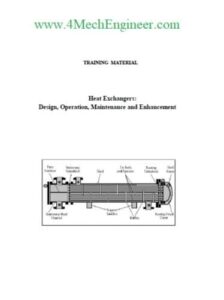Heat Exchanger Training Course Material
Heat Exchanger Training Course Material
Heat Exchanger Training Course Material Will give you a better understanding of the basic principles of heat transfer and fluid flow also their application to the design and operation of heat exchangers that you gain from this course will enable you to improve their efficiency and extend their life. You understand how to use the applicable API, TEMA and ASME recommended practices, standards and codes for heat exchangers. This will enable you to communicate with the designers, manufacturers also bidders of heat exchangers. You will understand how to avoid fouling, corrosion and failure and leak problems by your design. You will also be able to survey and troubleshoot heat exchangers and assist in performing inspection, cleaning, and also maintenance.
The course includes worked examples to reinforce the key learning as well as a demonstration of mechanical design and challenging problems encountered in the operation of heat exchangers.
You can also read Gas Turbines Training Course Design & Operation
Table of contents
- Introduction
![Heat Exchanger Training Course Material]()
- Classification of heat exchangers
- Code and standards
- Basic Design Equations of Heat Exchangers
- Thermal Design
- Specification sheet
- Storage, Installation, Operation and Maintenance
- Heat exchanger tube side maintenance (Repair vs replacement)
- Troubleshooting
- Unresolved problems in the heat exchangers design
Course Material Objectives
- To learn the classification, code and standards (API, TEMA,…) also selection procedure for heat exchangers.
- Review the thermal and mechanical design of heat exchangers.
- Learn the installation, operation also maintenance procedure for heat exchanger.
- Acquire information that will enable decisions to be made on the repair and refurbishment of aging equipment as well as repair vs. replacement options.
- Learn techniques of failure elimination and appropriate maintenance also troubleshooting procedures.
- Delineate the factors that lead to overall economically advantageous decisions.


Comments are closed.